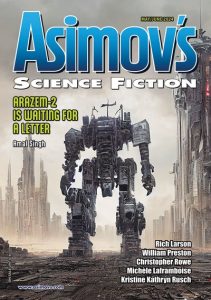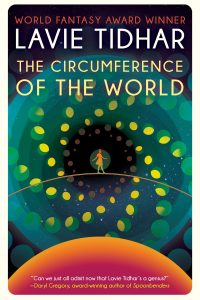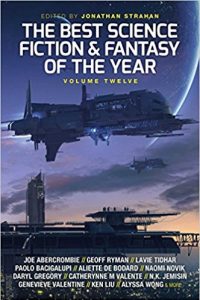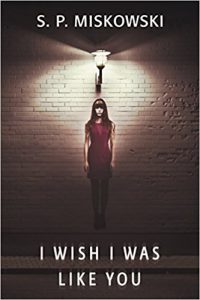A.C. Wise Reviews Short Fiction: Asimov’s
The May/June 2024 issue of Asimov’s includes three novellas, making it perfect for readers wanting to sink their teeth into some longer short fiction. The first of the three, opening the issue, is “Barbarians” by Rich Larson. Yanna and his partner Hilly have been hired to take a pair of creepy rich twins on an expedition into a decaying deepswimmer. Hilly is essentially a head in a jar after taking the fall for a job that went wrong and ending up in a prison that disposes of its inmates’ bodies in order to save space. Hilly runs things from the ship while Yanna tries to cope with his guilt, keep his clients alive, and determine their true motive. It turns out the twins are searching for a bio-coded vault that will open only for their genetic line, which their sister is after as well. Dangers and double-crossing abound in a fast-paced story with a cinematic feel. Larson has a talent for building worlds and characters with depth and a feeling of life extending beyond the page. This novella is no exception, with its evocative descriptions and the complicated, entangled histories of its characters. Very nicely done.
“Last Thursday” by Kristine Kathryn Rusch finds a time traveler visiting 2020, despite the warnings around the year. Amidst the loneliness of the pandemic, he happens across a sign seemingly pointing to a meeting of fellow time travelers taking place “last Thursday.” He becomes obsessed with finding the correct Thursday, but through repeated jumps fails to find the meeting, happening upon a memorial for a woman who died of COVID instead, and then meeting the woman herself. It’s an interesting twist on both a pandemic story and a time travel story, highlighting how often humans willfully act against their own self-interest. “Arazem-2 Is Waiting for a Letter” by Amal Singh is a poignant and painful story looking at the cost of war. Arazem, a former warbot, now does odd jobs while awaiting a letter from the Emancipation Bureau freeing him to live his own life. He’s stuck in a city where most humans have a deep distrust of and hatred for bots, blaming them as symbols of a war in which they were little more than weapons. Singh imbues the story with emotion and effectively uses an SF lens to look at the way veterans are too often treated – sent off to fight wars, then discarded and looked down upon when they return home. At the same time, the story offers a note of hope, counterbalancing but not outweighing the grim subject matter.
“The Rattler” by Leonid Kaganov (translated by Alex Shvartsman) delves into the psychology of crowds and how humans respond to the perception of being judged by others. A mysterious alien – either creature or weapon – arrives on Earth and begins randomly slaughtering humans. After speaking with a professor, a news crew determines the only way to defeat it is to trick a mob of humans into overwhelming the alien by making it seem like they have the technology to broadcast anyone’s cowardice to the world, shaming individuals into putting the good of humanity above self-preservation. “The Shadow Box” by M. Bennardo is a sweet story exploring the concept of faith and scientific study, while also looking at parent-child relationships. A family discovers a strange box on their new property, which the son determines is meant to attract shadow birds. The catch is that the species cannot be directly observed; the only evidence of their existence is the changes left behind in their environment. It’s a lovely example of quiet speculative fiction holding up a mirror to human behavior.
“To Make an End” by William Preston is the second of the three novellas in the issue, and the conclusion of a five-story cycle by the author, making it somewhat hard to judge as a standalone piece. After a long search, siblings Isaac and Shoshanna finally discover the “Old Man,” a legendary pulp hero and mythic figure, in an underground vault. The world has been devastated by a series of plagues and climate disasters, and now people, including their parents, are disappearing. Isaac and Shoshanna believe the “Old Man” is their only hope. Preston manages to capture the spirit of a pulp adventure, without the story feeling dated, and there’s some excellent worldbuilding at work. The novella also provides an opportunity to reflect on the act of mythmaking and the role legends and heroes can play in a society.
“In the Palace of Science” by Chris Campbell similarly captures the feeling of classic science fiction, as the main character is recruited by a brilliant and reclusive scientist. The Professor believes he’s recovered a piece of advanced technology from a lost, ancient civilization, and wants help rebuilding it. Once the two men succeed in waking the automaton, they discover it has a purpose of its own. Like Preston’s story, there’s some very nice worldbuilding in this novelette as well, and it feels like it would be at home alongside Frankenstein and other works in the “has science gone too far” subgenre.
“Renting to Killers” by Elena Pavlova adopts a removed and distant tone to tell the story of a couple running a boarding house, who are brutally attacked and robbed only to have their most unassuming renter carry out revenge on their behalf, which he then uses as fodder for his new novel. “Cynthia in the Subflooring” by Christopher Rowe is a flash piece summed up by its title. Cynthia falls through the floor of her aunt’s house, spends a brief time in the subflooring conversing with the Hound of the Afterworld, then continues to fall.
The issue closes with the final of the three novellas, “Maragi’s Secret” by Michèle Laframboise. Set in a world where the Victorian Kingdom has moved into floating sky cities, Maragi works as a “monkey” on her father’s airship, carrying out repairs in small and precarious spaces where grown men can’t fit. Her presence aboard is kept secret from some, and barely tolerated by others; if her identity as a girl were widely known, her father would face charges for violating Victorian decency laws. While doing repair work, Maragi discovers a pair of nesting albatrosses and steals their egg. If she can find the right buyer, she will be able to pay off her father’s debts and get them back on track. Now she must protect her identity and the egg, while fending off unwanted advances and tracking down a thief, among various other complications. The novella is full of rich detail bringing the setting and characters to life, and overall, it’s a fun and satisfying adventure.
Recommended Stories
“Barbarians”, Rich Larson (Asimov’s 5-6/24)
“Arazem-2 Is Waiting for a Letter”, Amal Singh (Asimov’s 5-6/24)
This review and more like it in the July 2024 issue of Locus.
 While you are here, please take a moment to support Locus with a one-time or recurring donation. We rely on reader donations to keep the magazine and site going, and would like to keep the site paywall free, but WE NEED YOUR FINANCIAL SUPPORT to continue quality coverage of the science fiction and fantasy field.
While you are here, please take a moment to support Locus with a one-time or recurring donation. We rely on reader donations to keep the magazine and site going, and would like to keep the site paywall free, but WE NEED YOUR FINANCIAL SUPPORT to continue quality coverage of the science fiction and fantasy field.
©Locus Magazine. Copyrighted material may not be republished without permission of LSFF.









The following text on this page
“arrives on Earth and beings”
should be
“arrives on Earth and begins”
Maybe the follow-up to the Rattler could be that the aliens decide that broadcasting fears is a good idea and create such a system and provide it to everyone, but people develop coping mechanisms to deal with it.
A third story applies the broadcast of fear selectively, where it gains some power by not being consistent.
Thanks
Thanks!